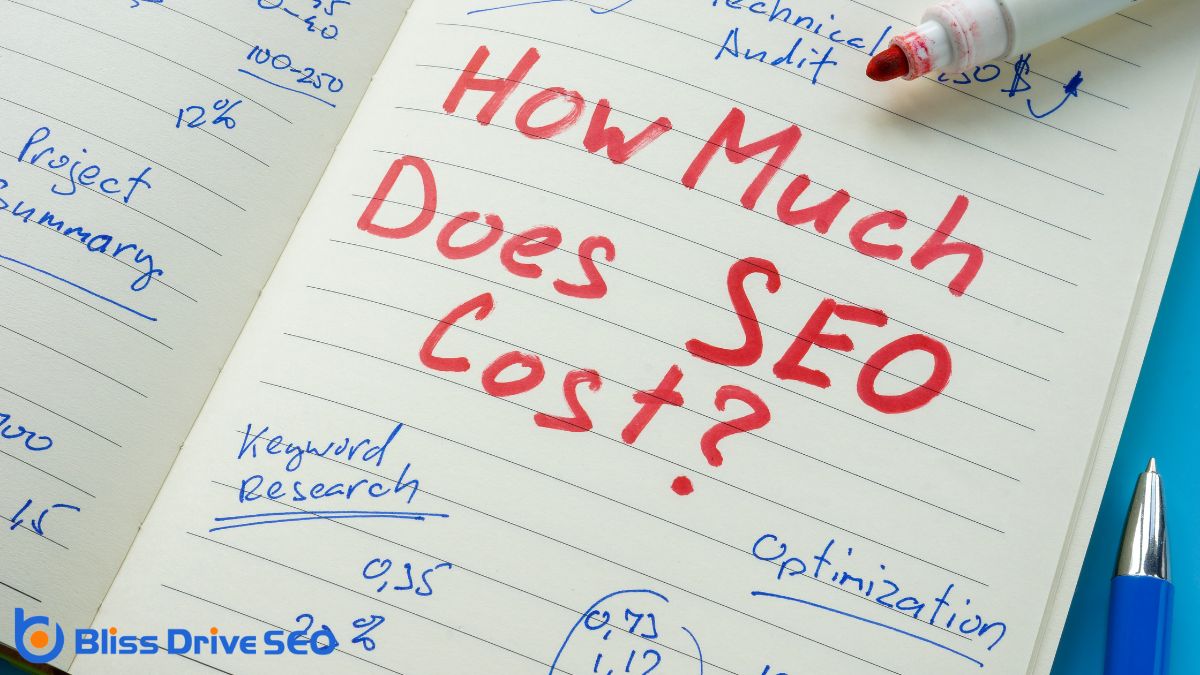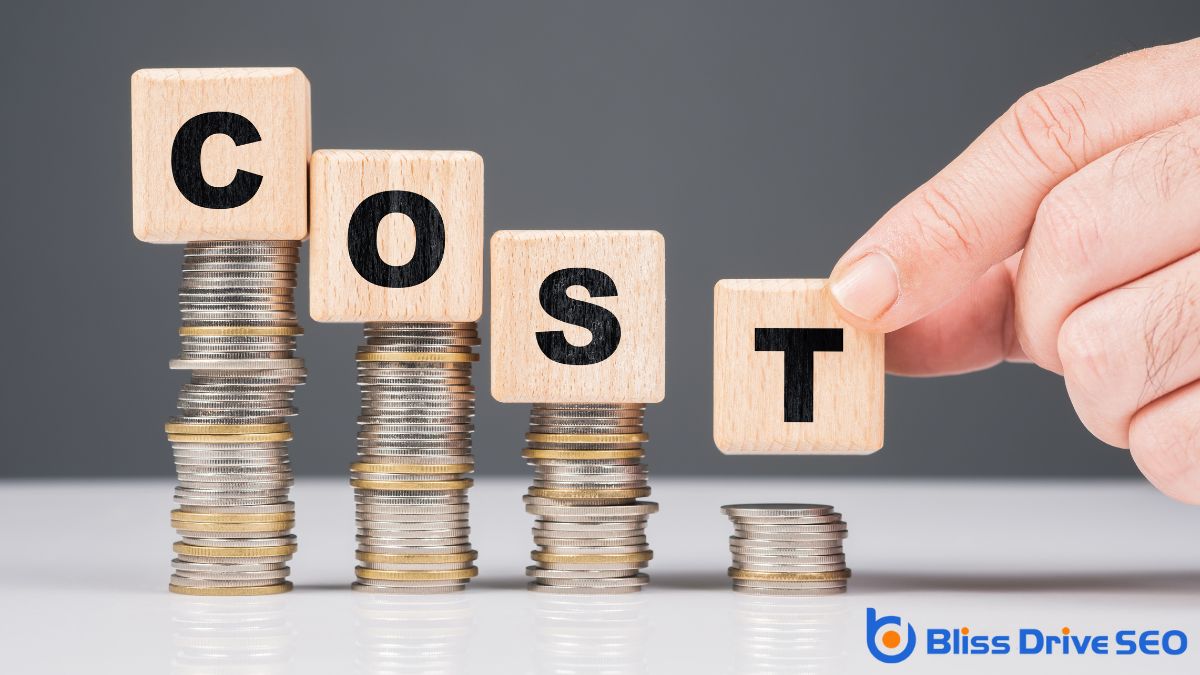Learn More About Us

When you're considering the cost of SEO on Google, you might wonder why there's such a wide range in pricing. Is it the complexity of your industry or the expertise of the provider that drives these costs? You might find yourself balancing between hourly rates and project-based fees, each with its own set of expectations and deliverables. But how do you decide what's right for your business without overspending or under-investing? Unraveling the intricacies behind these numbers could be the key to maximizing your SEO budget and achieving the results you desire.

When considering SEO costs on Google, several key factors come into play that can greatly impact your budget.
First, the competitiveness of your industry and target keywordsWords or phrases that users type into search engines to find information. will determine how much effort is needed to rank higher. If you're in a nicheA specific segment of the market targeted by affiliates to promote products or services. with high competition, expect to invest more in your SEO strategy to stand out.
Next, the current state of your website's SEO is pivotal. If your site needs significant optimization, including technical fixes or content improvements, this will naturally increase costs. Regular updates and maintenance are also essential, as SEO isn't a one-time project but an ongoing process.
Additionally, your geographic target area can influence costs. Local SEOOptimization strategies aimed at improving a website’s visibility in local search results. might be less expensive than national or international campaigns, depending on your business's scope.
The expertise and experience of the SEO provider you choose will also impact the price. Working with a seasoned agency or consultant might come with a higher price tag, but their expertise can yield better results.
Lastly, your specific goals and how quickly you want to achieve them can drive costs up. More aggressive strategies usually require larger budgets to see faster results.
When you're considering SEO services, you'll want to understand both on-page optimizationImproving individual webpages to rank higher and earn more relevant traffic in search engines. techniques and off-page strategies. On-page optimization focuses on improving elements within your website, like content and meta tagsHTML tags that provide information about a web page to search engines and visitors., to enhance search visibility.
Meanwhile, off-page strategies involve efforts outside your site, such as link buildingThe process of acquiring backlinks from other websites. and social media engagementThe interaction between a brand and its audience on social media, including likes, comments, shares,..., to boost your online presence.
On-page optimization techniques frequently play a pivotal role in enhancing your website's visibility on search engines. By focusing on elements within your site, you can enhance how search engines interpret and rank your content.
Start with keyword researchThe process of finding and analyzing search terms that people enter into search engines. to identify terms your audience is searching for, then strategically incorporate these keywords into your web pages, such as titles, headers, and meta descriptions.
Don't overlook the significance of content quality. Engaging, informative, and unique content keeps users on your site longer and encourages sharing, which can boost your rankingsThe position at which a website appears in the SERP.. Make sure your content answers your audience's questions and addresses their needs.
Also, confirm your site is mobile-friendly, as search engines prioritize mobile-optimized sites due to the increasing number of users browsing on phones and tablets.
Pay attention to technical aspects, like site speed and URL structure. A faster-loading site provides a superior user experience, reducing bounce rates. Clean, descriptive URLs help search engines grasp your content's relevance.
Lastly, use internal linkingLinks that connect different pages on the same website. to direct visitors through your site, aiding them in discovering more pages and enhancing overall site navigation. By mastering these on-page techniques, you'll elevate your site's search engine performance.
Why focus solely on your website when off-page strategies can greatly boost your SEO performance? Off-page SEOOptimization actions taken outside the website, primarily involving backlinks and social media. involves actions taken outside your own site to impact your rankings within search engine results. It's about building a network of trust, authority, and relevance by earning backlinksLinks from other websites pointing to your website, crucial for SEO., fostering social media engagementThe interactions that users have with a brand’s content on social media., and leveraging local SEO.
Start with link building. Backlinks from reputable sites act as votes of confidence, signaling to search engines that your content is valuable. Prioritize quality over quantity; a few links from authoritative sites can outweigh dozens from lesser-known domains.
Social media can amplify your reach. When people share your content on platforms like Twitter or Facebook, it increases visibility and potential traffic, indirectly boosting SEO. Even though social media links are typically "no-follow" (which means they don't directly impact rankings), they can drive traffic and engagement.
Local SEO strategies, like managing your Google My Business profile and earning local reviews, enhance visibility in region-specific searches. This is essential if you're targeting a local audience.
When considering hourly SEO pricing, you'll want to understand the factors affecting these rates, such as the consultant's experience and your project's complexity.
Typically, hourly rates can range from $75 to $200, but choosing the right SEO expert goes beyond just cost. Evaluate their expertise and track record to guarantee they align with your business goals.
The landscape of SEO pricing is influenced by several key factors that determine hourly rates.
First, the experience level of the SEO professional plays a significant role. More seasoned experts often charge higher rates due to their proven track record and deep understanding of SEO strategies. If you hire someone with extensive experience, you're likely to pay a premium for their skills.
Another vital factor is the complexity of your project. Simple projects might only require basic SEO techniques, which generally cost less. However, if your website needs an extensive overhaul or you're targeting competitive keywords, expect higher rates due to the increased workload and expertise required.
Geographic location also affects pricing. SEO professionals in major cities or regions with a high cost of living tend to charge more than those in less expensive areas. Additionally, the size and reputation of the SEO agency or consultant can impact their rates. Well-known agencies with a robust portfolio may charge more for their services.
Lastly, the specific services you need will influence the cost. Some professionals offer specialized services like technical SEOOptimizing the server and website structure to improve search engine crawling and indexing. audits or advanced analyticsThe systematic computational analysis of data or statistics to gain insights and support decision-ma..., which can affect pricing. Understanding these factors helps you make informed decisions about hiring SEO services.
Diving into the usual price range for hourly SEO pricing, you'll find that rates can vary markedly based on several factors. Generally, SEO professionals might charge anywhere from $75 to $200 per hour. This range accounts for the level of expertise and experience, the complexity of the project, and the specific goals you're aiming to achieve with your SEO strategy.
If you're working with a seasoned expert or a well-established agency, expect to be on the higher end of that spectrum. They bring years of experience and a proven track record, which often justifies the cost.
However, if your budget is tighter, you might consider hiring a less experienced SEO consultantAn expert who provides advice and strategies to improve a website’s SEO. who charges closer to the lower end. They can still offer value, especially for smaller projects or less competitive markets.
Understanding this range helps you set realistic expectations and align your budget with your SEO needs. It's vital to remember that while cost is important, the quality of work and the ability to meet your business objectives should guide your decision. Investing in the right SEO service can greatly impact your online visibility and business growth.
Although selecting the right SEO specialist can be challenging, it's vital for achieving your digital goals. When considering hourly SEO pricing, you must understand what you're getting for your investment. Hourly rates can vary significantly, typically ranging from $75 to $200 per hour, depending on the specialist's experience and location. Keep in mind that a higher rate doesn't always guarantee better results, but it can indicate a seasoned professional with a proven track record.
To choose the best SEO specialist, start by clearly defining your goals. Are you looking to enhance website traffic, improve search engine rankings, or increase conversionThe completion of a desired action by a referred user, such as making a purchase or filling out a fo... rates? Once you've outlined your objectives, search for specialists who specialize in your specific needs.
Examine their portfolios and client testimonials to gauge their success rate and ensure they've experience in your industry.
Communication is key. Make sure the specialist is willing to explain their strategies and provide regular updates on progress. Transparency builds trust and allows you to understand how your investment is working for you. By taking these steps, you'll be better equipped to find an SEO specialist who aligns with your goals and budget.
When selecting the right SEO strategy, considering monthly SEO packages can offer a structured and ongoing method to enhance your website's visibility. These packages typically include a variety of services, such as keyword research, content creation, link building, and performance tracking. Opting for a monthly plan means you're investing in continuous optimization, as SEO isn't a one-time solution.
It's a developing process that requires regular updates and adjustments.
You'll notice that monthly SEO packages vary in cost, usually depending on the range of services and the expertise of the provider. Some packages might focus on specific areas like on-page optimization or local SEO, while others offer a more all-encompassing approach. Selecting a package that aligns with your business objectives and budget is crucial.

Unlike monthly SEO packages, project-based SEO fees offer a more flexible approach to addressing your website's specific needs. If you have a specific area that needs attention, like a site audit or a content overhaul, this option allows you to concentrate solely on that project. Instead of committing to a long-term contract, you pay for the services crucial for the task at hand. This approach can be more cost-effective if you have a clear understanding of what needs improvement.
When you opt for project-based fees, you'll collaborate with SEO professionals who create a customized plan. They'll determine the scope, timeline, and deliverables for your project, making sure you're fully aware of what to anticipate. This clarity can be advantageous if you're on a tight budget or have a one-time need. It's vital to communicate your goals and expectations clearly so the project will align with your desired outcomes.
Bear in mind, however, that SEO is an ongoing process. While project-based fees target specific issues, you may require additional projects in the future to sustain your site's performance. This approach is ideal if you value flexibility and don't require continual SEO supervision.
Choosing between an SEO agencyA company that offers SEO services to clients, helping improve their search engine rankings. and a freelancer can greatly impact your digital marketing strategy. Each option has its own pros and cons, so understanding them can help you make the best decision for your needs.
Agencies usually offer a team of experts, providing a broad range of skills and services. They can handle larger projects and have more resources, which means they can often deliver faster results. However, agencies typically come with higher costs due to overhead expenses.
On the other hand, freelancers often bring specialized skills and can provide a more personalized approach. They tend to be more flexible and can adapt to your specific needs easily. Freelancers usually charge less than agencies, which can be beneficial if you're on a tight budget. But, keep in mind that a freelancer mightn't have the same capacity or resources as an agency, which could affect their ability to handle larger or more complex projects.
Ultimately, your choice depends on your budget, project scope, and desired level of expertise. Carefully weigh your options, considering both the short-term and long-term objectives of your SEO strategy.
While deciding between an SEO agency or a freelancer is important, it's also worth considering the option of managing SEO in-house. Doing so gives you full control over your strategies and aligns efforts closely with your business goals.
You'll need to hire a team or at least one skilled professional dedicated to SEO tasks. This includes keyword research, on-page optimization, technical site audits, and content strategyA plan for creating, publishing, and managing content to meet business goals..
In-house SEO costs can vary significantly depending on your team's size and expertise. Salaries for SEO specialists in the U.S. can range from $50,000 to $100,000 annually, based on experience and location. Additionally, you'll need to invest in tools for analytics, keyword tracking, and site optimization, which can add a few thousand dollars more each year.
An in-house team offers the advantage of being more integrated with your company's culture and processes. They can respond quickly to changes and work closely with other departments to make sure cohesive marketing efforts. However, the initial investment is substantial, and you'll need to make sure of continuous training to keep up with the ever-changing SEO landscape.
This approach requires a long-term commitment but can yield substantial rewards if managed effectively.
Uncovering hidden SEO expenses is vital for effectively budgeting your efforts. When you immerse yourself in the world of SEO, it's easy to overlook some costs that aren't immediately visible.
For starters, you mightn't expect to invest in premium tools for keyword research, competitive analysis, or analytics tracking. These tools can be essential for success but often come with subscription fees that add up over time.
Additionally, think about content creation. You may need to hire skilled writers or designers to create compelling content and visuals, which can be costly. Quality content is key to engaging your audience and improving rankings, so it's a worthwhile investment.
Let's not forget about technical SEO, which might require you to bring in experts to optimize your website's structure and speed. This can involve unforeseen expenses like upgrades to hosting services or new software.

Creating a realistic budget for your SEO investment is essential for maximizing your return on investment. You need to understand what aspects of SEO require funding and how they align with your overall business goals. Start by evaluating your current SEO performance to identify areas needing improvement. This will help you allocate your budget more effectively.
Consider both one-time expenses and ongoing costs. One-time expenses might include website redesigns or initial keyword research, while ongoing costs could involve link-building efforts, content creation, or monthly analytics reports.
You should also factor in the costs of using SEO tools, which can vary widely depending on the features you need.
Don't forget to set aside funds for potential adjustments. SEO is an ever-evolving field, and algorithms can change, requiring you to adapt your strategies. It's wise to reserve a portion of your budget for unforeseen changes or opportunities.
When considering SEO costs on Google, focus on your specific needs and goals. Understand that prices vary based on factors like industry competitiveness and the expertise of the provider. Choose between hourly rates, monthly packages, or project-based fees, and decide if an agency or freelancer suits your needs. Remember to account for hidden expenses and adjust your budget accordingly. Ultimately, investing wisely in SEO can leadA potential customer referred by an affiliate who has shown interest in the product or service but h... to significant returns and enhanced online visibility.
